The Delhi (Gurgaon)-based Educomp Solutions Ltd is in the process of rolling out a master plan to revolutionise K-12 education in two of the world’s most populous countries, and transform into a heavyweight global provider of digital content driven education products and services. Dilip Thakore reports
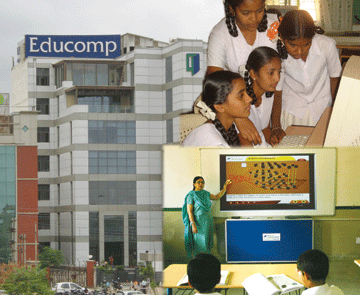 A palpable sentiment of quiet confidence and hum of business efficiency is discernible in the six-storied headquarters of the fast-track Delhi (Gurgaon)-based Educomp Solutions Ltd (ESL, sales revenue: Rs.276.90 crore in 2007-08) — India’s largest provider of information technology (IT)-enabled products, processes and services to K-12 (kindergarten to class XII) schools.
A palpable sentiment of quiet confidence and hum of business efficiency is discernible in the six-storied headquarters of the fast-track Delhi (Gurgaon)-based Educomp Solutions Ltd (ESL, sales revenue: Rs.276.90 crore in 2007-08) — India’s largest provider of information technology (IT)-enabled products, processes and services to K-12 (kindergarten to class XII) schools.
Although the company gathered business momentum in 2006 when it went public, it already provides IT infrastructure, digitised curriculum and content and teacher training services to 1,200 private schools countrywide where 1.01 million students have signed up for its patented Smart Class suite of IT-driven learning services. Moreover, 7,300 government schools with an aggregate enrollment of 4 million students in 13 states across the country have contracted with the company to avail of its ICT (instructional computing technologies) services, under which ESL builds IT infrastructure for them in partnership with state governments on the BOOT (build, own, operate and transfer) model.
Evidently keen to maintain its 100 percent plus annual record of growth and expansion, on May 27, ESL — one of the fastest growing companies in India and a darling of the stock exchanges — went transnational by finalising a joint venture with the Singapore-based Raffles Education Corporation (market cap: Rs.8,600 crore), the largest education provision group in the Asia Pacific region. Under the terms of the 50:50 joint venture, ESL will offer the professional education study programmes of Raffles Education in India, starting next academic year, and also with its help introduce the entire suite of ESL’s K-12 technology products and services into the contemporary world’s largest market: The People’s Republic of China. In short, ESL is in the process of rolling out a master plan to revolutionise K-12 education in two of the world’s most populous countries to position itself as a heavyweight global provider of digital content driven education products and services.
The widely acknowledged visionary and corporate architect behind the phenomenal growth of ESL is the company’s energetic promoter chairman and chief executive Shantanu Prakash (43). A commerce graduate of Delhi’s Shriram College of Commerce, with an MBA from IIM-Ahmedabad, in 1988 Prakash took the then courageous option of abjuring a well-paid corporate placement in favour of promoting an education services enterprise to “develop content to impact the pain areas of school education and support teachers to improve learning outcomes in classrooms across the country”.
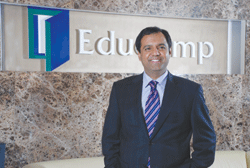 “We were the first business enterprise to act on the belief that education needs additional intellectual capital and contemporary technology driven solutions. After struggling in the initial years to sell this proposition to investors and banks, in 1994 we set up a learning lab at a capital cost of Rs.6 lakh in Carmel Convent School, Gwalior. For the first time we introduced a unique business model under which we would recover our capital and interest costs by way of the school levying a modest per student fee for use of the lab. We were the first company to introduce the BOOT model in school education enabling students and teachers to become IT literate and improve their teaching-learning outcomes, and schools to become owners of the sophisticated computer labs at the end of a short five-year period. Following the successful introduction of this model, we became the first education company to go public in 2006 when we raised Rs.50 crore to grow our businesses — expansion of the Smart Class programme, stepping up our business with governments to bridge the digital divide, enhancing content development and accelerating global expansion. Since then we have continuously improved and augmented our unique model through our 400-strong R&D department and demonstrated that it can dramatically improve learning outcomes in schools. Hence the appreciation of ESL within the stockmarket and the community of educators across the country,” says Prakash.
“We were the first business enterprise to act on the belief that education needs additional intellectual capital and contemporary technology driven solutions. After struggling in the initial years to sell this proposition to investors and banks, in 1994 we set up a learning lab at a capital cost of Rs.6 lakh in Carmel Convent School, Gwalior. For the first time we introduced a unique business model under which we would recover our capital and interest costs by way of the school levying a modest per student fee for use of the lab. We were the first company to introduce the BOOT model in school education enabling students and teachers to become IT literate and improve their teaching-learning outcomes, and schools to become owners of the sophisticated computer labs at the end of a short five-year period. Following the successful introduction of this model, we became the first education company to go public in 2006 when we raised Rs.50 crore to grow our businesses — expansion of the Smart Class programme, stepping up our business with governments to bridge the digital divide, enhancing content development and accelerating global expansion. Since then we have continuously improved and augmented our unique model through our 400-strong R&D department and demonstrated that it can dramatically improve learning outcomes in schools. Hence the appreciation of ESL within the stockmarket and the community of educators across the country,” says Prakash.
Following the base win-win-win (school-student-company) business model of ESL receiving the thumbs-up from school promoters, principals and state governments across the country, and the number of private and public schools on its client list rising from 20 and 75 in 2001 to 1,200 and almost 7,500 currently, the Educomp top management has rapidly diversified the business operations of the company.
In the company’s accounting year ended March 31, 2008, ESL’s major businesses were Smart Class (for private schools) which contributed 46 percent of gross revenue (Rs.127.78 crore); ICT Solutions (government schools) which contributed 31 percent (Rs.93.32 crore); professional development (teacher training) 9.25 percent (Rs.25.62 crore) and retail and consulting 5.5 percent (Rs.15.36 crore). Moreover the K-12 schools segment where it is the indisputable market leader apart, the company has established its footprint in several other high-potential education-related businesses with huge global growth and development opportunities.
Domestically it has promoted its Roots and Wings division to build a countrywide chain of high-quality pre-schools for children in the age group two-six under the franchise model. In primary/secondary education, ESL has drawn up a plan to establish a chain of 150 bricks-and-mortar Millennium schools, “powered by the Millennium Learning System — India’s first fully integrated learning development system”, which will be promoted by independent trusts and societies across the country. In the tertiary education space, next year a college established in the NCR (National Capital Region) in collaboration with the Singapore-based Raffles Education Corp will start providing English language, business management, hospitality and fashion design diploma programmes.
Yet even as ESL is simultaneously diversifying its products and services mix within the massive Indian marketplace by venturing into online tutoring, it is developing markets abroad through the acquisitions route. Early this year, ESL acquired a Singapore-based education technology company Ask ‘n’ Learn which has a client list of 140 global education institutions including 120 schools in Singapore and several in Indonesia, Brunei, Vietnam etc. Moreover through its wholly-owned subsidiary Educomp Asia Pacific Pte. Ltd it has also acquired a 51 percent equity stake in Learning.com, a US-based company providing web-enabled curriculum and e-learning solutions. And (as mentioned earlier) it has contracted several partnership agreements with the Singapore-based Raffles Education Corp to promote secondary (including the first Raffles School outside Singapore) and tertiary education institutions in India and China.
Nevertheless, even though Prakash is hedging his bets by diversifying this fast-track company’s markets by planting its corporate flag in the world’s largest education products and services markets — Asia Pacific, US and China — where ESL enjoys significant labour and product development cost advan-tages, its top management entertains few doubts that 21st century India which grudgingly and ungraciously hosts the world’s largest child population (450 million) and is belatedly warming to the idea of developing its abundant human resource, is its prime theatre of operations.
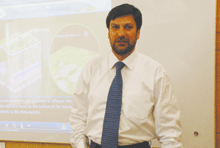 According to Abhinav Dhar, an alumnus of Jammu and ICFAI universities and former head of NIIT’s K-12 ICT programme (1994-2000) who signed up with ESL in 2002 as president of its K-12 Smart Class division which provides digital content solutions to 1,200 private schools across the country, the company has barely scratched the surface of the huge latent market for its integrated Smart Class solutions. “Reliable estimates indicate there are 50,000 independently managed schools countrywide which are our potential customers. Of this universe, although we are doubling our client base every year, we have established our Smart Class knowledge centres with dedicated servers connecting every classroom through campus-wide networks in only 1,200 schools. And given that no other company or enterprise provides full service technology, teacher training and digitised curriculum, constantly upgraded by our 400-strong R&D division, at such modest prices — Rs.80-150 per month per student — we believe it’s only a matter of time before the overwhelming majority of private schools become ESL customers,” says Dhar who conducted a marketing blitzkrieg of road-shows in 114 cities last fiscal to demo the Smart Class program to school principals.
According to Abhinav Dhar, an alumnus of Jammu and ICFAI universities and former head of NIIT’s K-12 ICT programme (1994-2000) who signed up with ESL in 2002 as president of its K-12 Smart Class division which provides digital content solutions to 1,200 private schools across the country, the company has barely scratched the surface of the huge latent market for its integrated Smart Class solutions. “Reliable estimates indicate there are 50,000 independently managed schools countrywide which are our potential customers. Of this universe, although we are doubling our client base every year, we have established our Smart Class knowledge centres with dedicated servers connecting every classroom through campus-wide networks in only 1,200 schools. And given that no other company or enterprise provides full service technology, teacher training and digitised curriculum, constantly upgraded by our 400-strong R&D division, at such modest prices — Rs.80-150 per month per student — we believe it’s only a matter of time before the overwhelming majority of private schools become ESL customers,” says Dhar who conducted a marketing blitzkrieg of road-shows in 114 cities last fiscal to demo the Smart Class program to school principals.
Dhar’s optimism is not over-blown either. Across the country, principals of well-reputed schools have reacted enthusiastically to the Smart Class IT-enabled suite of services. “We are really proud to be associated with Educomp. Ever since we started the model classroom concept with technology, we haven’t looked back,” says Dr. Shyama Chona, the high-profile principal of Delhi Public School which was ranked No.1 in the IMRB-EducationWorld survey of the country’s top 250 schools last year.
Adds Dr. Y.G. Parthasarathy, the legendary promoter-director of the Chennai-based Padma Seshadri Bal Bhavan (PSBB) group of schools: “It has always been my dream to see technology becoming an integral part of a teacher’s life inside the classroom. The Smart Class programme implemented by Educomp has indeed been a dream come true.” So impressed has Dr. YGP been with ESL, that the PSBB Group which manages four schools in Chennai, has signed up with the company to promote the nexgen PSBB Millennium School (estb. 2005), which offers ESL’s 03 (one-on-one) personal laptop learning program to class III-IX students. Every child enrolled in the 03 program is equipped with an Intel Class Mate laptop computer and learns interactively via the laptop with the class teacher.
"The use of the Class Mate laptop has encouraged teachers to expand their creativity to make presentations, prepare worksheets independently and also work in teams. ESL’s multimedia based instruction materials have significantly improved learning outcomes and saves the time of teachers by enabling immediate assessment,” says Sita Umamaheshwaran, principal of the co-ed PSBB Millennium School which has an aggregate enrollment of 2,000 students.
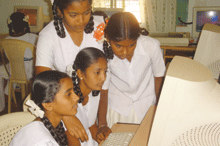 Moreover combining business with political correctness and scalability considerations, right from the start Prakash also began selling the idea of computer learning labs for government schools to the Central and state governments. Introducing computer education in government schools, he argued before change-resistant bureaucrats, would narrow the digital divide between high-end private schools and under-funded state government schools. This argument prevailed and over the past five years the company’s computer aided learning program (CAL), under which ESL establishes computer labs, provides multimedia courseware and resource personnel to hand-hold teachers, has been enthusiastically welcomed by 13 state governments and is operational in 7,289 government schools. Last fiscal this division generated one-third (Rs.93.32 crore) of the company’s revenue.
Moreover combining business with political correctness and scalability considerations, right from the start Prakash also began selling the idea of computer learning labs for government schools to the Central and state governments. Introducing computer education in government schools, he argued before change-resistant bureaucrats, would narrow the digital divide between high-end private schools and under-funded state government schools. This argument prevailed and over the past five years the company’s computer aided learning program (CAL), under which ESL establishes computer labs, provides multimedia courseware and resource personnel to hand-hold teachers, has been enthusiastically welcomed by 13 state governments and is operational in 7,289 government schools. Last fiscal this division generated one-third (Rs.93.32 crore) of the company’s revenue.
Architecturally similar to the Smart Class business model, the ICT division’s revenue model varies slightly. Whereas in private schools parents are billed, in government schools the per student computer lab/CAL usage fee is paid by state governments. And although inevitably the per student fee is less than in private schools, the ESL management pulls out all the stops to provide full service to its subscriber schools based on the simple calculus that there are 1.12 million government schools countrywide against a mere 75,000 private/independent primary-secondaries. Therefore quite clearly from the scalability angle, government schools are indispensable for the growth and development of the company’s business.
 “The ICT package of services we provide to government schools is available in English and 13 other Indian languages. Typically the package includes a knowledge centre hub in every school where students can learn computer usage and languages, teachers are trained to deliver prescribed classroom content with the aid of CAL, and content is constantly updated and improved on the basis of inputs received from our R&D division. Our technology driven knowledge centres and supplementary digitised content services provided to government schools have proved very popular and have dramatically narrowed the digital divide between private and government schools across the country,” says Soumya Kanti, an alumnus of the Delhi College of Engineering and IIM-Ahmedabad who served a long stint with Eicher International prior to signing up with ESL in 2001 where he has risen to the position of president of the ICT division.
“The ICT package of services we provide to government schools is available in English and 13 other Indian languages. Typically the package includes a knowledge centre hub in every school where students can learn computer usage and languages, teachers are trained to deliver prescribed classroom content with the aid of CAL, and content is constantly updated and improved on the basis of inputs received from our R&D division. Our technology driven knowledge centres and supplementary digitised content services provided to government schools have proved very popular and have dramatically narrowed the digital divide between private and government schools across the country,” says Soumya Kanti, an alumnus of the Delhi College of Engineering and IIM-Ahmedabad who served a long stint with Eicher International prior to signing up with ESL in 2001 where he has risen to the position of president of the ICT division.
The third major business of the company which also fulfills an urgent national need is development, aka teacher training. This division, which contributed 9.25 percent of ESL’s gross revenue (Rs.25.6 crore) in 2007-08, has developed its patented The QuEST (Quality Education for Teachers and Students) clutch of IT-enabled programs for teachers, parents and NGOs. Integrating technology with syllabuses and pedagogies, the programs empower them to transact school curriculums more efficiently. According to the company’s annual report, “on a cumulative basis, nearly one million” teachers across the country have been trained in one or more QuEST programs.
Moreover recently to “bridge the skills gap in India”, ESL has entered the professional education and training business focusing on vocational education and employability solutions. For starters it has taken over the management of 16 Central government-owned Vocational Industrial Training Institutes (formerly Industrial Training Institutes or ITIs) under the PPP model as also 12 Skill Development Centres of the Gujarat state government. “Educomp will work directly with domain experts in retail management, engineering and other aligned disciplines to engender an appropriate blend of industry and pedagogical best practices for such institutions,” says a company publication.
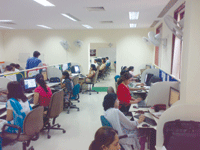 All this activity focused upon improving learning outcomes in the country’s classrooms — an ideal continuously neglected by post-independence India’s benighted Central planners enamoured of the simplistic input-out model devised by Prof. Mahalnobis way back in the 1950s — has required ESL to ride the information technology boom of the past two decades to innovate intellectual property. To its credit, ab initio the top management of the company foresaw the need for a well-equipped and carefully staffed R&D (research and development) division which would adapt and/or develop contemporary information technologies to peculiar Indian classroom conditions characterised by electricity outages, dust, paucity of maintenance personnel etc. Also to innovate new user-friendly pedagogies, products and processes for a society which for centuries has placed high premium on memorisation skills and rote learning. Therefore the company has invested heavily in a massive stand-alone R&D facility spread over 22,000 sq.ft in Noida on the outskirts of Delhi, which houses the great majority of its 400-strong team of R&D professionals and incurs an annual expenditure of Rs.30 crore.
All this activity focused upon improving learning outcomes in the country’s classrooms — an ideal continuously neglected by post-independence India’s benighted Central planners enamoured of the simplistic input-out model devised by Prof. Mahalnobis way back in the 1950s — has required ESL to ride the information technology boom of the past two decades to innovate intellectual property. To its credit, ab initio the top management of the company foresaw the need for a well-equipped and carefully staffed R&D (research and development) division which would adapt and/or develop contemporary information technologies to peculiar Indian classroom conditions characterised by electricity outages, dust, paucity of maintenance personnel etc. Also to innovate new user-friendly pedagogies, products and processes for a society which for centuries has placed high premium on memorisation skills and rote learning. Therefore the company has invested heavily in a massive stand-alone R&D facility spread over 22,000 sq.ft in Noida on the outskirts of Delhi, which houses the great majority of its 400-strong team of R&D professionals and incurs an annual expenditure of Rs.30 crore.
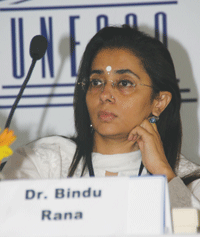 “The R&D division is the think-tank and the products, processes and services development hub of the company. Perhaps uniquely for an education company, all new products and services are conceptualised, designed and piloted in this division. We employ over 400 well-qualified professionals who are experts in different subjects, content development and software design,” says Dr. Bindu Rana, a political science and special education alumna of Mumbai University who also has a Ph D in education awarded by the university. Currently Rana who signed up ESL in 2004 after serving for two years as research director of ADDI (Action for Disability, Development and Inclusion), is the research programme director of the company.
“The R&D division is the think-tank and the products, processes and services development hub of the company. Perhaps uniquely for an education company, all new products and services are conceptualised, designed and piloted in this division. We employ over 400 well-qualified professionals who are experts in different subjects, content development and software design,” says Dr. Bindu Rana, a political science and special education alumna of Mumbai University who also has a Ph D in education awarded by the university. Currently Rana who signed up ESL in 2004 after serving for two years as research director of ADDI (Action for Disability, Development and Inclusion), is the research programme director of the company.
According to Rana, over the past four years, ESL’s R&D division has innovated “several large systems and product lines” for the company. Among them: a compre-hensive pre-school system for the company’s new Roots to Wings chain of pre-schools being rolled out across the country; a complete IT-enabled Millennium Learning System for use in the state-of-the-art ESL-sponsored Millennium K-12 schools also being rolled out nationwide; pioneering a one-on-one laptop school learning system in collaboration with Intel, and conceptualising and designing a new operating system christened 03, “which will be the next big technology innovation in the classroom”.
Now with this nexgen company having established a dominant presence in the public and private K-12 schools segment, which it is consolidating with the commercial-isation of a steady stream of ICT-driven products and services (see box p.36), Educomp has recently ventured into the under-served pre-school and tertiary education segments.
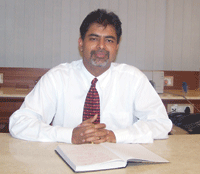 To drive the growth of its newly launched Roots to Wings chain of pre-schools, ESL has signed up Arun Khetan, hitherto chief executive of the KidZee chain of 550 pre-schools, who over a five-year period engineered the growth of Kidzee into India’s largest group of nurseries for infants in the age group two-six under the franchise model.
To drive the growth of its newly launched Roots to Wings chain of pre-schools, ESL has signed up Arun Khetan, hitherto chief executive of the KidZee chain of 550 pre-schools, who over a five-year period engineered the growth of Kidzee into India’s largest group of nurseries for infants in the age group two-six under the franchise model.
Although he came aboard as recently as April this year, the Mumbai-based Khetan, a former chartered accountant with considerable industry experience, has already recruited a team of 65 professionals and signed up 30 “very carefully selected” franchisees across the country. “The unique sales proposition of Roots to Wings is the ‘eclectic approach’ pedagogy designed over a two-year period by our R&D division, which draws upon the best practices of established early education pedagogies such as the multiple intelligences, Playway and Montessori schools of thought. The great advantage of working with ESL is that it is a wholly education-focused company driven by serious R&D activity. Therefore I believe we will be able to set new standards and benchmarks in early childhood education,” says Khetan.
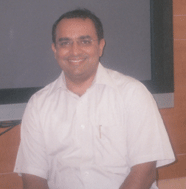 Likewise to lead Educomp’s foray into tertiary education, Prakash and the company’s top brass have enlisted a heavyweight professional with formidable qualifications and impressive track record. Early this year Rohit Kumar, an alum of IIT-Roorkee and the Wharton School of Business whose business and industry experience includes stints in the US with Andersen Consulting, Boston Consulting and Oracle, and in India with Wipro and Microsoft, took charge as ESL’s president of higher education and internet services. Assigned the brief to mastermind the company’s entry into the higher education space, Kumar has set himself stiff deadlines. “In the next academic year starting in 2009, we intend to admit the first batch of 300-400 students into our first professional college sited in the National Capital Region which will offer diploma programmes in business English, business management, hospitality and fashion design. In the longer run we are gearing to establish private colleges and universities across the country at the invitation of state governments. I believe there’s growing demand for private initiatives in higher education to meet the quality tertiary education aspirations of young people as also to reduce the high training costs of Indian industry,” says Kumar.
Likewise to lead Educomp’s foray into tertiary education, Prakash and the company’s top brass have enlisted a heavyweight professional with formidable qualifications and impressive track record. Early this year Rohit Kumar, an alum of IIT-Roorkee and the Wharton School of Business whose business and industry experience includes stints in the US with Andersen Consulting, Boston Consulting and Oracle, and in India with Wipro and Microsoft, took charge as ESL’s president of higher education and internet services. Assigned the brief to mastermind the company’s entry into the higher education space, Kumar has set himself stiff deadlines. “In the next academic year starting in 2009, we intend to admit the first batch of 300-400 students into our first professional college sited in the National Capital Region which will offer diploma programmes in business English, business management, hospitality and fashion design. In the longer run we are gearing to establish private colleges and universities across the country at the invitation of state governments. I believe there’s growing demand for private initiatives in higher education to meet the quality tertiary education aspirations of young people as also to reduce the high training costs of Indian industry,” says Kumar.
Given the company’s impressive track record of focus, innovation, quick project implementation and rapid product and market diversification, ESL’s equity shares are much fancied by intelligent investors. Currently (July 30) the equity share (face value: Rs.10) issued to investors at Rs.125 when the company went public on January 13, 2006 is quoted at Rs.2,936 on the National Stock Exchange. Therefore the company’s market capitalisation (number of equity shares issued multiplied by price) is Rs.5,089 crore, making ESL (no. of employees: 4,500) India’s most valuable education company.
Comments Prashanth Nayak, the Bangalore-based branch manager of IL&FS Invest Mart, the well-known financial advisory firm: “By all conventional yardsticks of corporate evaluation — return on equity, return on capital employed, and cash flow — ESL’s numbers are excellent. The company’s business model is unique and unprecedented. It lacks peers for comparison purposes.”
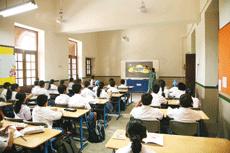 With ESL having struck responsive chords in private and government schools, the teachers community, and rapidly diversifying its learning products, processes, services as well as markets, it’s hardly surprising that Shantanu Prakash, the visionary promoter-chairman and chief executive of the company, is bullish about the future. “Contrary to popular belief, education is highly valued by people of all classes and communities of India. Therefore there is increasing pressure from people at the bottom of the social pyramid for quality education with a rising number of families prepared to spend large proportions of their household incomes to provide high quality education to their children. With the Indian economy maintaining high rates of growth and the middle class expanding rapidly, private and public expenditure on education will increase and learning outcomes will improve. And Educomp will help to facilitate this process,” says Prakash.
With ESL having struck responsive chords in private and government schools, the teachers community, and rapidly diversifying its learning products, processes, services as well as markets, it’s hardly surprising that Shantanu Prakash, the visionary promoter-chairman and chief executive of the company, is bullish about the future. “Contrary to popular belief, education is highly valued by people of all classes and communities of India. Therefore there is increasing pressure from people at the bottom of the social pyramid for quality education with a rising number of families prepared to spend large proportions of their household incomes to provide high quality education to their children. With the Indian economy maintaining high rates of growth and the middle class expanding rapidly, private and public expenditure on education will increase and learning outcomes will improve. And Educomp will help to facilitate this process,” says Prakash.
It’s a consummation devoutly to be wished .